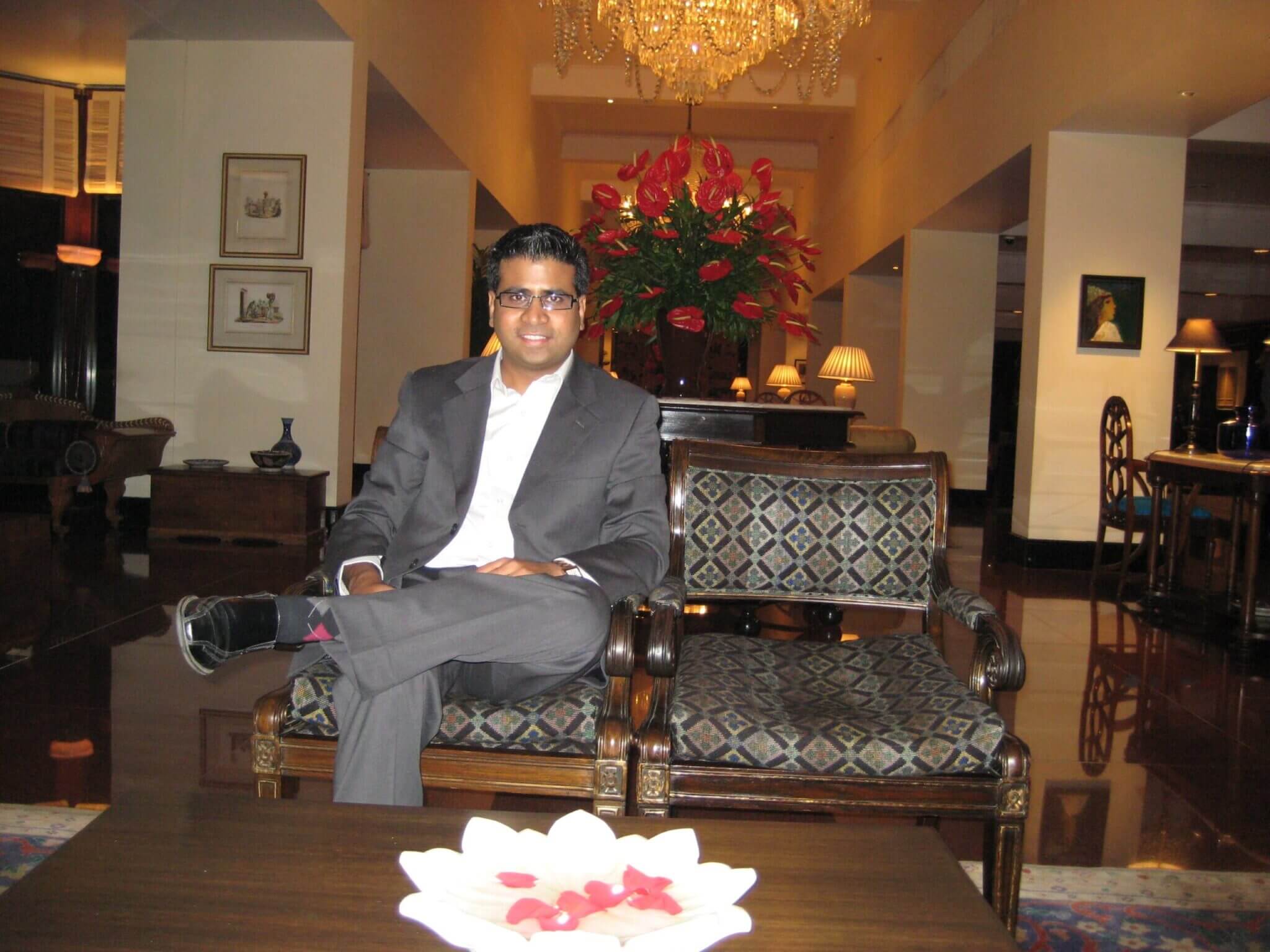Sunil Chala completed BTech in Electrical Engineering from IIT Delhi in year 1997. This was followed by 17 years of international experience in product creation, technology and team management. Sunil subsequently spent 10 years in United Kingdom working for companies like Philips Semiconductors and ST-Ericsson Mobile Platforms. Ultimately he decided to embrace his true calling, with his own startup, Wiwigo.
In your own words what is Wiwigo?
Wiwigo is an online outstation or inter-city taxi booking service. We specialize in one-way inter-city travel on true one-way fare that saves upto 50% of the fares that other vendors offer. We also offer roundtrip taxi services as well. Transparency, customer service and safety are the cornerstones of our services.
How did you come up with the idea of Wiwigo?
It was through sheer frustration and willingness to improve our lives. I could not book a train ticket under the Tatkal scheme to attend a family function in Chandigarh, so I had to book a cab. I just needed a drop to Chandigarh but the vendor charged me for the roundtrip as he wouldn’t get the return fare. Throughout my journey, I felt that it was a massive waste of money, fuel and human resources. Also, it somehow didn’t make sense to me why it should be the state of affairs as there must be hundreds of people travelling in the opposite direction. Why can we not match these passengers up with these taxis and in turn save all the hassle? During a casual chat with the driver, who had grayed his hair in taxi industry, I learnt that the whole taxi market functions in this manner and they charge for both ways. This got me thinking that this was high time that somebody stood up and tackled this long pending problem.
Could you walk us through the process of starting up Wiwigo?
The starting up process started with an internal personal journey. I had to convince and prepare myself for the “battle”. The greatest challenge was to leave my corporate career and start from scratch as an entrepreneur. There was immense pressure from the family, relatives and some friends to continue my 9-5 gig and forget about my entrepreneurial dream. It took a lot of convincing and persuasion to have my family and friends align with me. Some still think that I am crazy, but I am ok with this.
Then I started assembling the team and started the development process.
Did you encounter any particular difficulties during startup?
Hiring the right and talented team was very important for me. But, at times it was a long process with its own surprises. A lot of young talented people are under peer or family pressure to join an MNC or well established company. So I had to enrol and convince some talented people to join our team. I am very lucky that I was able to persuade and create a great and talented team that we have with Wiwigo today.
How have you been developing Wiwigo since startup?
We have paid special attention to keep our website light and very fast to load. Choosing the right technology, right stack and the flexibility to make quick changes were very important to us. We did a lot of A/B testing and evolved the product where it is now. Right now we have a website which is mobile responsive and a call centre for taking bookings. Our vendor partners have the vendor mobile app that they use to manage their inventory and manage booking fulfilment. We are in the process of finishing our user Android App.
We have also put in great effort to collaborate with a variety of vendor partners so as to cater to the breadth of the demography. I am pleased to say that we have almost all types of cars with us starting from Tata Indica, Tempo Traveller to Rolls Royce.
What kind of feedback did you get for Wiwigo so far?
People love our services and customer centric approach. Wiwigo has seen a great traction since inception. We were doing bookings even before our system was complete and ready. People simply love our one-way pricing service which saves them up to 50% of normal cab rental.
What is your strategy against your competition?
In this segment, we do have some competition but it’s largely from unorganized players. The inter-city one way taxi space is yet to see the emergence of any credible player. In our view, the market is wide open. At the same time this space is huge for many large players to co-exist.
Nevertheless, Wiwigo is always on its toes to innovate in technology and marketing. We are using various innovative growth hacking techniques to make our mark in the industry.
Have you developed any industry insights that you could share?
There are two distinct segments in the taxi booking business. One is intra-city where customers travel from one point to another within the same city. Another is inter-city where customers travel from one city to a different city. Wiwigo operates in the inter-city segment.
Intra-city online taxi booking in India is almost taken. It has both capex heavy and capex light players in the market with good overall market penetration. I think now everybody agrees that we have first three market leaders clearly established in point-point space in both categories.
On the other hand, inter-city cab booking market is full with tourist taxi or roundtrip vendors. We think there is no clear mainstream player in that market and a dominant player who covers the breadth of the market is yet to emerge. This space is very fragmented and unorganized. The customers face frequent issues with transparency, quality of service and driver behaviour.
Apart from all these, we discovered a great segment to pitch our battle and that is one-way travel at true one-way fare. For example, if somebody is to travel from Delhi to Chandigarh, other vendors would charge Rs 6000 whereas we would charge only Rs 2499 for a sedan. Thus, many times we are able to quote even lower than half the price that other vendors charge.
What is the future of the industry?
Outstation taxi service industry market size is around USD 9 Billion which is expanding by 20-25% year on year. We believe that we are addressing this market and as well as a bigger passenger transport market of around USD 30 Billion.
We see tremendous growth potential in inter-city one way travel. We already have an overcrowded train system and bus services are not frequent enough. Under these severe transportation issues, we believe the customer needs an alternative, more convenient and price competitive solution. We are very excited about the future of Wiwigo.
Was there anything that disappointed you initially?
Well, vendor behaviour and their mindset disappointed or rather shocked me initially. The non-transparency was also disappointing. I was surprised to observe their short term vision that became worse with the onset of holiday peak season, i.e. April – July. We had to work very hard through our business development process to find out nuggets of gold, so to speak. We are pleased that we were able to find out great vendors to partner with. Some of our vendor partners are able to establish a large territorial network by leveraging our platform.
What do you think about being an entrepreneur in Asia?
I think that it is harder in many Asian countries and it is certainly harder in India. In most Asian countries, entrepreneurship is still to be recognized as a viable career option. There is a lot of pressure on the entrepreneur from the family, friends and peer groups to choose a more stable and “normal” path than entrepreneurship, which to them is full of risks and uncertainty. Also, capital markets do not always favour entrepreneurs here. But, the tide is now turning and we see a rising trend of investment in number and in size going into Indian startups. We believe that this will trigger a change in general mindset and create an environment for startups to thrive.
What is your opinion on Asian entrepreneurship vs Western entrepreneurship?
In the West, the mindset of general public and administration is very supportive. They have right system and regulatory frameworks in place largely.
On the other hand, Asia especially India and China offer a humongous market size coupled with evolving nature of everything. There are still so many problems to be solved both socially and commercially. At the same time, more and more people are entering into the middle class with ever increasing disposable income. It presents entrepreneurs with huge opportunities. It’s also heartening to see a maturing startup ecosystem emerge in India, specially.
What is your definition of success?
I am a very simple person and my definition of success is very simple. Success to me is achieving that that gives me happiness and peace of mind in the long run on a more sustainable basis.
Why did you decide to become an entrepreneur?
I have had very rich and variety of experiences in my life. By keeping to my existing career, I would not have expanded either my experiences or my growth as a human being. My calling was elsewhere. I believe entrepreneurship is the perfect place where I want to be. I am learning new things, evolving and experiencing new adventures every single day.
In your opinion, what are the keys to entrepreneurial success?
In my view, patience, fanatic determination, aptitude towards experimentation, great tolerance to failure and of course a bit of luck are keys to entrepreneurial success.
Any parting words of wisdom for entrepreneurs out there from your personal experience?
Never let the fear of failure overpower you from experimenting.
Connect





























